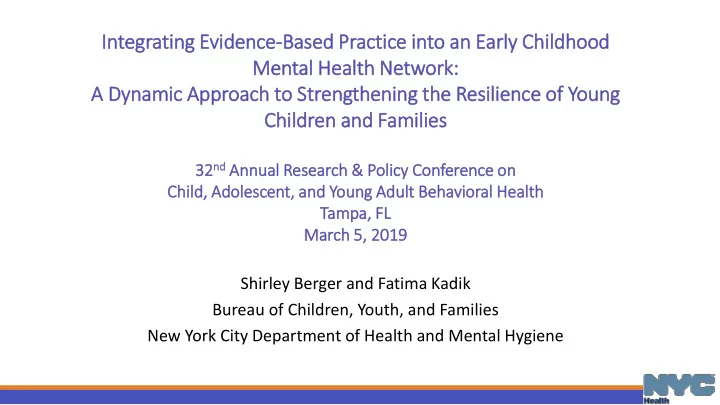

1 Integratin In ing Evid idence-Based Practic ice in into an Early Chil ildhood Mental Hea ealth Network: : A Dynamic Approach to St Strengthening th the Resilience of f Young Chil ildren and Families nd Annual Research & Pol 32 nd 32 olicy Con onference on on Child ild, Adole lescent, an and You oung Adult Behavioral l Healt lth Tam ampa, FL FL Mar arch 5, 5, 20 2019 19 Shirley Berger and Fatima Kadik Bureau of Children, Youth, and Families New York City Department of Health and Mental Hygiene
Agenda New York rk Cit ity Early Childhood Mental Hea ealth Network Workforce Development Activities Capacity Building Cycle for evidence-based models Assess, Sel elect, Train, Evaluate Les essons Learned 2
ThriveNYC : Act Early • Launched in 2015 • ‘Act Early’ – invest in prevention and early intervention • Funds a network of community-based early childhood mental health services • NYC Total Population (2017): 8.6M • Over 200 languages 2.0% 14.8% 31.9% White, non-Latinx Latinx 22.1% Black, non-Latinx Asian, non-Latinx Other 29.2% 3
Early Childhood Mental Health Network Se Servic ice Provid iders li linked to a Train inin ing Cen enter 4
Early Childhood Therapeutic Center (E (ECT CTC) ) Services Licensed mental health clinics offer 3 linked services: Mental Health • Mental Health Consultation Treatment • Capacity building support to staff at early care and education sites • Mental Health Treatment • To children birth to five , their siblings, and parents/caregivers Family Peer Mental Health • Family Peer Support Support Consultation • Peers integrated into clinics to support parents and caregivers 5
Early Childhood Workforce Development Foundational • Identified gap: insufficient workforce to address the Skills mental health needs of children birth to 5 • Funded a Training and Technical Assistance Center Clinical (TTAC) Practice • The TTAC is tasked with building capacity and competencies of mental health professionals and early childhood professionals in family serving Business Sustainability systems to identify and address the social-emotional needs of young children and their families 6
Training Str trategies In-person Tools and trainings resources Coaching Supervision calls Case Webinars studies Visit ttacny.org Website 7
Capacity Building Cycle Assess Capacity Building Needs Developmentally Appropriate Relationship-based Identify and Select Evaluate Strengths-based Models Culturally Respectful Practice Trauma-informed Train and Provide Implementation Support 8
Assess Assess Capacity Building Needs Evaluate Select Train Ongoing: 2016: Survey Participatory 2015: Survey of ECTC feedback of NYC Clinics Training process with Needs practitioners 9
Assess Id Identify fy and Select Models Evaluate Select De Define cri criteria for or sele lecting a model Train • Service setting • Target population • Type of practitioner • Cultural and linguistic needs • Cost Revi view th the e evid vidence base • Consider the populations included in the EBP studies • Are there adaptations or flexibility in the EBP? 10
Assess Train & Provide Im Implementation Support Evaluate Select Child Parent Psychotherapy Train • Trauma-informed, Dyadic • 18 months to be rostered • Clinicians trained • $1,785 per person Triple P Positive Parenting Program • Behavioral, parent-focused curriculum • 3 months to be accredited • Clinicians and family peer advocates trained • $2,322 per person 11
Assess Evaluate tr training and outcomes Evaluate Select Train Training Practitioner Child/Family • Post-training • Rate of utilization • Assessment tools evaluation survey (e.g., DECA, PSI, • Session/Fidelity PAFAS) • Practitioner focus checklists groups and calls • Family Assessment • Case of Care Survey • Ongoing presentations supervisor • Practitioner focus feedback groups and calls • Cost analysis 12
Challenges • Finding models that work for diverse populations – “one size” does not fit all • Staffing • Practitioners need different levels of training • Turnover • Data collection burden • Costs • EBPs are expensive (most don’t have a Train the Trainer model) • Ongoing implementation support and supervision • Time away from work (billable hours) 13
Key Ele lements of f Success Dedicated training center linked to network of service providers Flexible budget to respond to emerging training needs Multi-year process of assessment, selection, training, and evaluation Layers of support for organizations and practitioners Strengths-based, relational and trauma-informed approach 14
Acknowledgements • Network team: • NYC DOHMH Data & Evaluation: Janice Okeke, Jaimie Shaff, Elleanor Eng • NYC ECMH Training and Technical Assistance Center • NYC Early Childhood Therapeutic Centers’ practitioners • External: • Cricket Mitchell, Implementation Consultant • NYU Wagner Capstone Consultants • ThriveNYC • Families across NYC 15
THANK YOU! Contact: Fatima Kadik , MA Project Director Early Childhood Mental Health Services NYC Department of Health and Mental Hygiene fkadik@health.nyc.gov 16
Recommend
More recommend